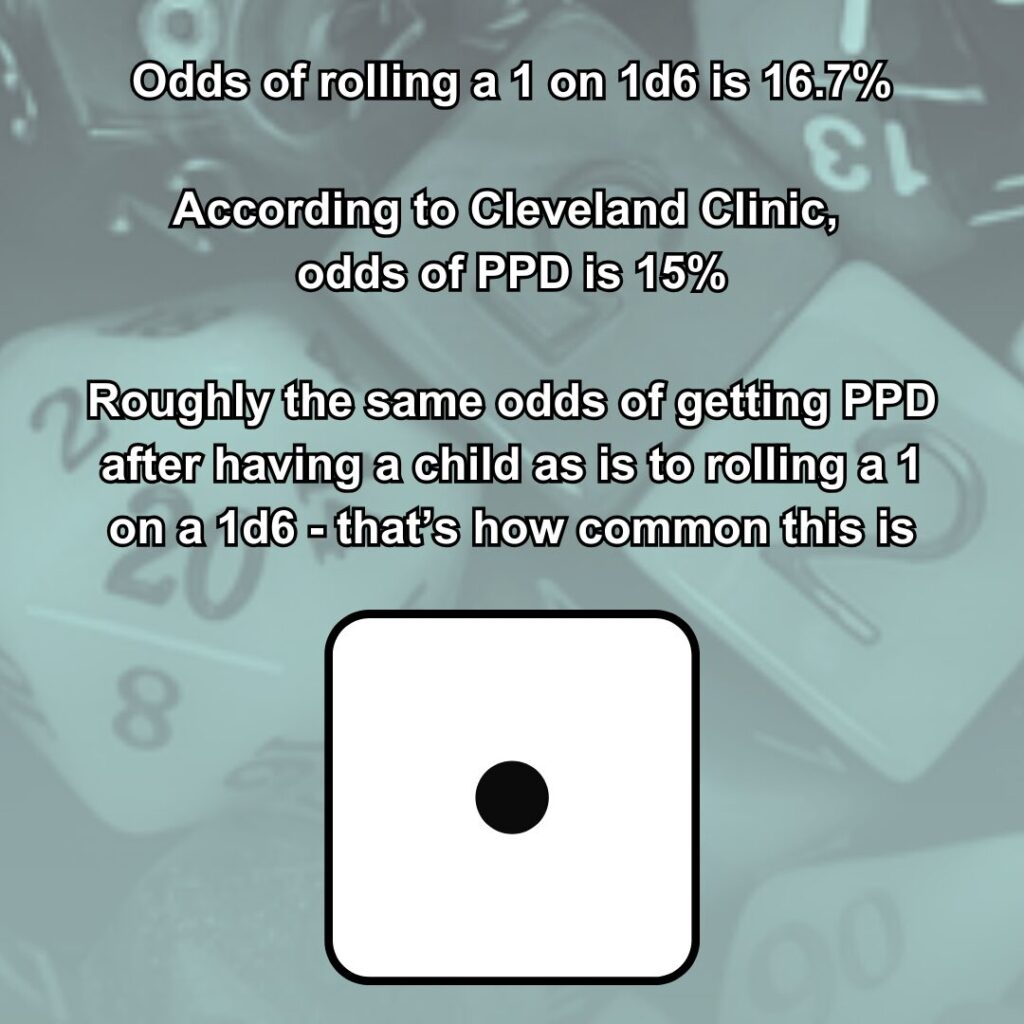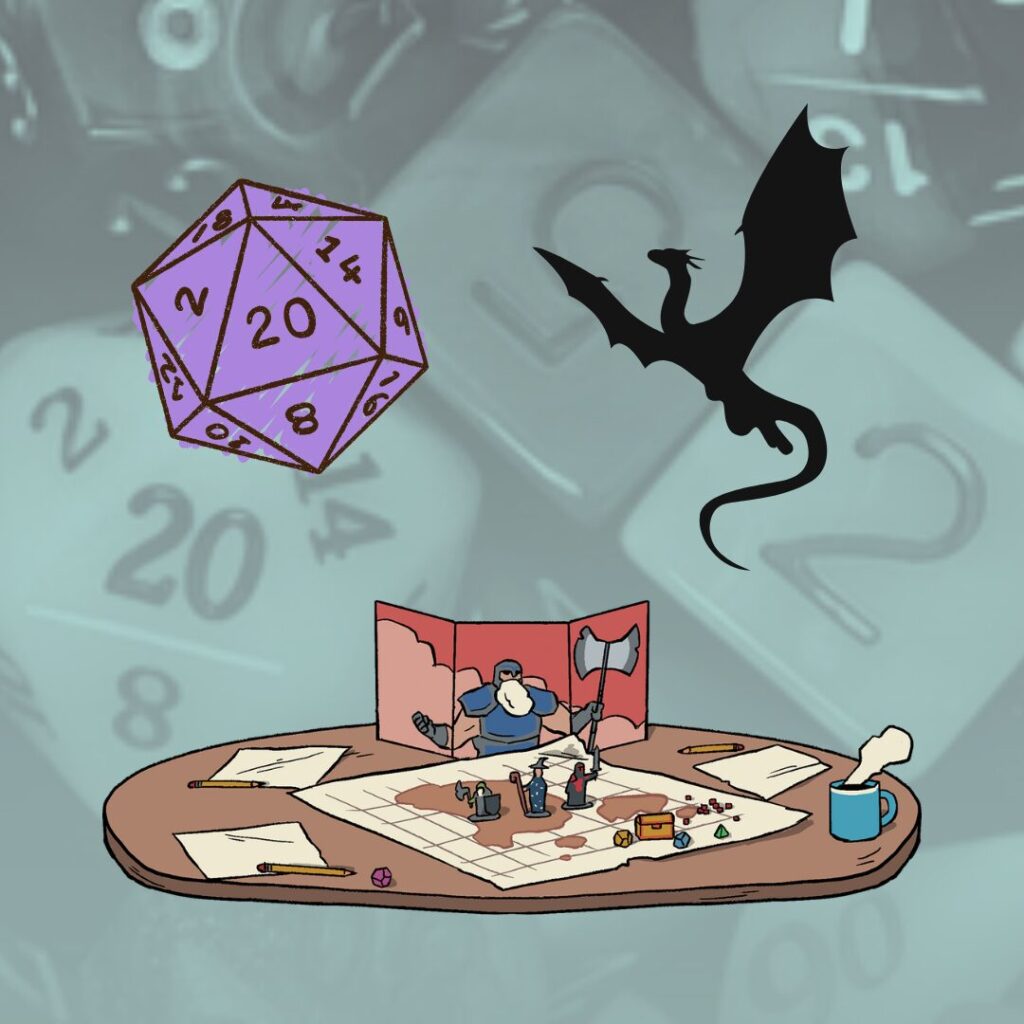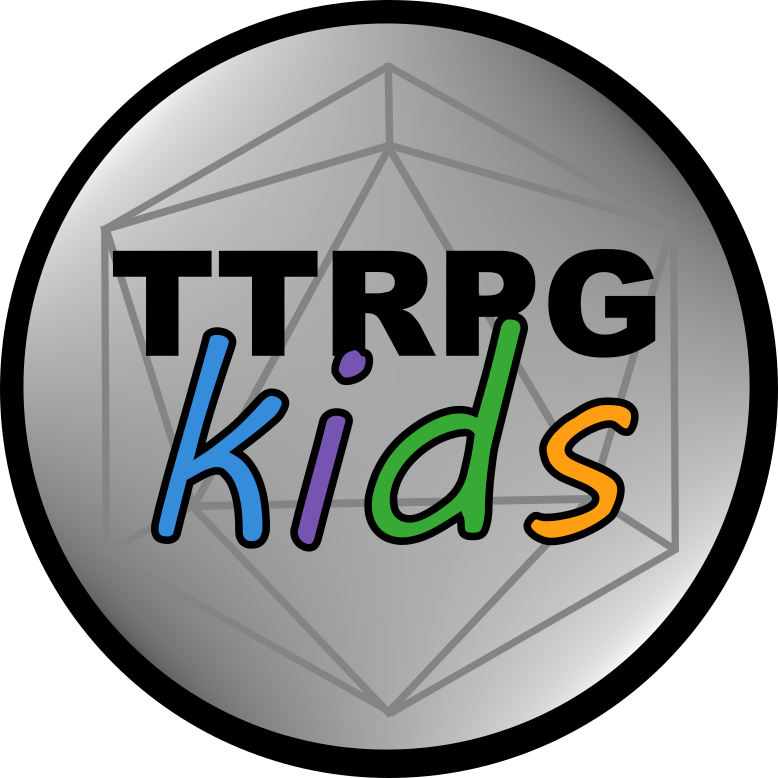My experience with postpartum depression and how D&D helped
Before I get into any discussion, I’m going to include resources, put trigger warnings on this article, and list a few disclaimers. Please read through these as the intention of this post is to help folks, and I don’t want someone to inadvertently be harmed.
Resources
If you or someone you know is struggling with this and requires support, the following resources may help:
Post Partum Support International 1-800-944-4773
US National Suicide & Crisis Lifeline call or text 988
Trigger warnings
While I am going to focus more on broad strokes about postpartum depression (PPD) and how D&D helped versus diving into all the details on PPD, this post will talk about my personal experiences and may touch on topics including: postpartum depression (PPD), general depression, loneliness, isolation, insomnia, anxiety, post traumatic stress disorder (PTSD), illness, self blame, medication, therapy
Disclaimers:
This is about my personal experience with PPD, and PPD is not the same for everyone. PPD can range greatly in symptoms, intensity, and appearance, and all of those experiences are valid.
D&D and D&D actual plays are not a replacement for medical intervention and therapy. I had medical intervention and went to therapy for treatment, and D&D helped me to reach some of my goals with that. I did not rely on D&D as a standalone source to treat my PPD.
Do not try to use D&D (or other TTRPGs) to enact therapy on your players unless you are a licensed medical professional with appropriate training to use D&D/TTRPGs for medical intervention. It is very easy to create unintentional triggers and can potentially make things worse even if the player does not immediately show outward signs in the game (many people hide their PPD).
Why am I writing an article about postpartum depression and D&D on TTRPGkids right now?
At this point, my kid is 7 years old, and I would say that I resolved my postpartum depression (PPD) about 6 years ago. I’m writing this post now because I’m able to write it today when I wasn’t able to write it before, and I believe this can help others.
I’m posting this on TTRPGkids because this is a space where I interact with a lot of parents, and that includes new parents who are excited to start TTRPGs with their kids one day. Sometimes that flows into a chat, and, because of what I went through, I do my best to ask how the parent is doing too… because a lot of folks are, understandably, not doing OK but don’t want to say anything.
And I feel that deeply.
It’s hard to just parse out for your own understanding the mix of “WOW! This baby is so beautiful! I am literally crying from joy at just holding them” and “why do I feel like there’s an empty hole in my chest… when will this go away” then “aw! Baby found his toes!” and “baby slept all night… I wish I could have slept when my baby was sleeping… I’m so tired… why can’t my body just sleep”, let alone to reach out to someone about it when there is so much expectation from so many angles.
PPD is fairly common, but not many people talk openly about it without judgement. It is stigmatized despite 15% of parents experiencing it (Cleveland Clinic). I want to note, that article uses the term “women” to cover the birthing parent, but not all birthing parents are going to fall under that label (for example, I am non-binary, and I am a birthing parent).
PPD is also very much NOT limited to birthing parents (PostPartumDepression.org, NIH). Adoptive parents and co-parents may experience this too.
PPD isn’t something to be moralized, it’s a health condition that might or might not happen when you have a kid. You didn’t choose for that condition, you basically rolled a 1 on a d6(ish), probably without much warning that PPD could be a thing… and you can’t just choose to not have it if that’s what you roll.
Have no judgement on the player for what they roll.

So, I’m writing this now to help new TTRPG parents who find the site to feel seen and a little less alone by seeing that someone else went through this.
I want to show how finding community in this hobby, beyond getting excited and waiting for your kid to play, can be helpful for you too.
For those that are having a hard time asking for help, this can be a place to read about it, if that’s an easier first step than talking or typing.
I want to give hope, too. It gets better…. it can REALLY suck sometimes, the lows can be very painful, and you can also get through this. All of that is true and valid.
I want to take some of the stigma out of talking about PPD by… talking about it. It’s easier to approach the subject when it’s already out in the open and you know someone who went through it.
TTRPGs are all about connecting and sharing stories together, and this is one of my stories.
It is a key backstory element for me, and I want to share it with you in the hopes that you find connection to your own story, or that you can understand someone else’s story (whether they be a partner, friend, or random stranger) a little bit better.
How my postpartum depression started, and how D&D helped me out
First, I had a kid.
My kid was wonderful and chaotic and snuggly and loud and messy… and still is.
I loved my kid then, and I still love my kid now.
I say that because this was not a quesiton about how much I loved my kid.
After I had kiddo, I felt tired and a bit down on myself and very out of my depth, but I figured it was “baby blues” which is a short term dip that often happens for a couple weeks after having a child, but… it didn’t go away, and it deepened throughout parental leave, getting sick (over and over and over), going back to the office, having trouble sleeping, and so on.
I tried to talk to a couple people about it, but they changed the subject, brushed it off, or said some unkind things, so I blamed myself for not being happy enough or appreciating my baby enough and tried to push through to “show up” for my family.
I also started to self isolate quite a bit – it wasn’t conscious, but I think I was unintentionally doing this to hide how much I was struggling and to control my environment in some way. Everyone wanted to talk about my awesome baby, and I was happy to do that, but it was also hard to be sitting there struggling and feeling that guilt from the previous paragraph bubbling up at the same time. It felt very weird, so I think I avoided it.
Then, my brother reached out to me to recommend a show that he found called Critical Role.

He knew I had played D&D once before (and I mean once… it was one session, but I loved it), a few years prior, so he thought I might like it. I thought it might be a good neutral thing to talk to him about since we didn’t really chat all that much, but I wanted to.
I watched the first episode… and I felt a spark for it.
Yes, the story was interesting, but what got me was that there were friends laughing together, working together, and supporting each other. They visibly cared about each other while playing a game.
And I could talk to my brother about the adventures unfolding! And it wasn’t something that was centered on being a parent, so that weird feeling combo wasn’t always there. I felt like a person talking versus a parent talking. We geeked out about it and the idea of playing our own game came up, and that was something that I wanted to do.
Despite that, in the background, the PPD did keep getting more intense… sleep became harder, my mood dropped, and I was spending every ounce I had and still coming up short.
Things still hurt.
And I did have some of these little moments, either in watching the show or in chatting with my brother, where I felt something other than depression or being in the parenting zone.
The two weren’t really something exclusive to each other.
I think, during this time, having at least this ONE thing gave me something to hold onto that wasn’t confusing and probably slowed down my PPD slide.
I held onto parenting too, but that was definitely confusing where watching Critical Role was something that was simply a point of connection.
It’s about here in the story that I started therapy, and I soo after started on an anti-depressant medication because it was clear that it was needed for the therapy to start taking root.
I was at about 6 months postpartum, and that was one of the lowest parts of my life mood-wise even if it might not have looked like it from the outside.
I continued going to therapy and worked on everything from monitoring how I was doing to reducing the self blame to tackling sleep issues to resting to trying to reach out to people…. And that’s where D&D and Critical Role come into play again.
Setting aside time for watching or listening to Critical Role became a consistent way for me to rest. It was also a way for me to connect with my brother and then also my other siblings and cousin who started to watch the show too.
We had a common talking point, and I eventually made a campaign.
We started meeting at my house every couple weeks, and they could come hang out with kiddo and have time with the baby, then, after kiddo’s bedtime, it was D&D time.
And things still hurt.
I still felt alone or like that pit or cavity was there most of the time, but I didn’t feel so alone in those D&D table moments.
It wasn’t a total erasure of that empty feeling, but it sure alleviated a decent chunk of it as we were diving into character stories and discussing the plot and taking on my weird homebrew creature creations.
It also gave me a creative project to think about during the day instead of letting the thought spiral take hold.
After about six months, I slowly came off the antidepressant medication due to not really liking how I felt on it and because therapy was working now that the medication had helped me get to a point to where it could take root… and I attribute achieving a couple of those therapy goals (resting, reaching out to others, etc) to having a D&D group and a circle that I could geek out with about our own stories and the stories in Critical Role.
Now, that first campaign was by no means perfect, and it crashed and burned after about a year (right around when COVID shutdown hit), which was hard for many reasons, but I also knew that wasn’t the end of all this because it had become something important to me.
I started another group that met virtually, discovered the online TTRPG community, introduced my kid to TTRPGs while we were still in COVID shutdown, got into playtesting, started TTRPGkids, worked with a teacher to make an EDU TTRPG series, taught work buddies how to play D&D, started speaking at conventions and making some amazing friends there, and so much more. It became this whole cascade of finding connections and community that I didn’t know I wanted to have in my life.

The impact that general connection can have
I’ve heard the Critical Role folks speak in interviews about how they never imagined the impact the show would have… this is one impact here. It gave me something to build a connection from and get excited about… and it helped me. That chain of events also eventually led to this site. Thank you for sharing your adventures.
My brother probably also didn’t know how that one recommendation to watch Critical Role was going to change things for me, but it did. He reached out to me with a friendly note (no judgement) when I was having a really hard time, and I cannot express how much that meant. Thank you, “little brother”, for reaching out.
A few folks have reached out to me about how TTRPGkids has impacted them, and I LOVE hearing these stories, even if it is something short like their kids played a TTRPG together, because I know what that small sentence can mean and what this all meant to me. Thank you for telling me your stories.
My point with listing these is to show that we have impact and that, even if maybe you can’t talk about the hard points right now, reaching out and being here is important and makes a difference even if we don’t really know it or see it at the moment. You matter, and talking about this is important.
Finding some kind of hope through all this
I do still struggle with general depression, outside of PPD, and it’s not something new. I’m also a neurodivergent person and am struggling with burn out, so there’s other challenges with living in this world sometimes. I’ve had this my whole life, and the PPD was just so particularly intense that it made me hit a point where I had to start looking at it in a different way and not always push myself through.
And… things still hurt… sometimes a lot.
The difference now, though, is that I also have a much stronger base.
If I need help, I have a process to follow now, and I also have a community and friends who I can chat with on a regular basis. I look forward to meeting up with folks in-person at conventions and to when someone reaches out to tell me about a new game they found or some shenanigans that their library TTRPG tweens group pulled. I enjoy discovering fun mechanics and settings, and it is always nice to get a new TTRPG show recommendation. Through TTRPGs, I found people who accept me, without judgement.
There’s still VERY hard days because my particular brain, body, and memories are still going to do their thing, but… I understand it more and I do have some support structure in place.
I did not feel that way 7 years ago, and it was extremely difficult not being able to visualize how things could improve, I think largely because I didn’t know anyone who would talk about being at a low like that. People said it would get better, and I logically knew that, but where was my example? Where was the proof? No one would talk about it!
So, my hope is that you find some hope in reading this because maybe this is an example that can help with your own experience or in understanding someone else’s. TTRPGs are us sharing stories, and this is one of mine that I want to share with you so you can use it too. Please know that you are not in this story alone.
Resources
If you or someone you know is struggling with this and requires support, the following resources may help:
Post Partum Support International 1-800-944-4773
US National Suicide & Crisis Lifeline call or text 988
If you found this post helpful, please subscribe to the TTRPGkids monthly newsletter to stay up to date on the latest reviews, tips and tricks, game and podcast list updates, and more.


